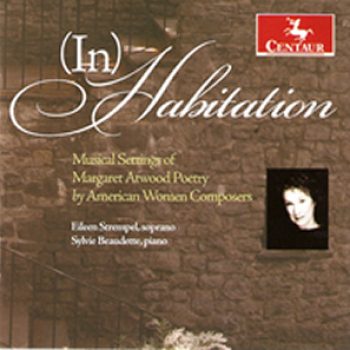(In)habitation: Musical Settings Of Margaret Atwood (Amazon, Arkiv Music), performed by soprano Eileen Strempel and pianist Sylvie Beaudette, focuses on settings of Margaret Atwood poems by American women composers. It includes the premiere recording of Lori’s Orange Afternoon Lover cycle.
“Lori Laitman’s trilogy Orange Afternoon Lover is a delight from start to finish, although there is palpable pain in the first song, “Against Still Life.”…The original poem is searing enough, but Laitman’s music puts flesh on the bone in remarkable fashion. In stark contrast, “I Was Reading A Scientific Article” features the amorous outpouring of someone who is clearly more comfortable in the realm of scientific jargon, with what sounds like the bubbling of test tubes in the intricate accompaniment. The third poem, “I Am Sitting On The Edge,” explores emotional fragility with discerning sensitivity, and Laitman’s simple choice of repeating the poem’s opening line at the end is a surprisingly strong statement in itself. It is not every composer who knows how to use a simple gesture to powerful effect, but Laitman is such a master composer.” (The Journal of Singing)
“Lori Laitman chooses first-person narrative texts for the three songs of Orange Afternoon Lover. They are also among the longest and most complex of the Margaret Atwood poems that appear on this compilation. It is no surprise that the image of “crack your skull like a walnut, split it like a pumpkin” from Atwood’s Against Still Life is rendered by Laitman in such a way that it retains incongruous shock value while avoiding derailment of the narrative. Likewise, her setting of the dubiously titled “I Was Reading a Scientific Article” is as buoyantly lyrical and whimsical as any of her many fine Dickinson songs. Although this self-described “accidental song composer” has been compared to Ned Rorem, Orange Afternoon Lover suggests she has much more in common with Samuel Barber by virtue of the sumptuous vocal lines and uncanny ability to craft Atwood’s free verse prose so well that it sings like poetry.” (Journal of the Society for American Music)

